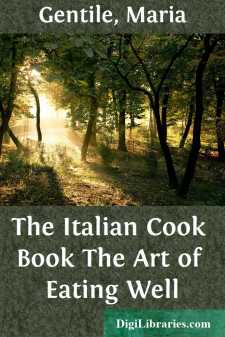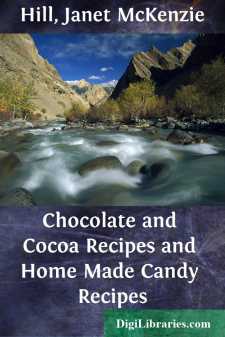Cooking
- General 70
- History 1
- Reference 10
- Regional & Ethnic 3
- Vegetarian 10
Cooking Books
Sort by:
SAUCES The philosophy of a sauce, when understood, enables even an untrained cook to make a great variety of every day sauces from materials usually found in every household; to have them uniform, however, flavorings must be correctly blended, and measurements must be rigidly observed. Two level tablespoonfuls of butter or other fat, two level tablespoonfuls of flour, must be used to each half pint of...
more...
by:
Maria Gentile
PREFACE One of the beneficial results of the Great War has been the teaching of thrift to the American housewife. For patriotic reasons and for reasons of economy, more attention has been bestowed upon the preparing and cooking of food that is to be at once palatable, nourishing and economical. In the Italian cuisine we find in the highest degree these three qualities. That it is palatable, all those...
more...
PREFACE The title of this book is not ambiguous, but as it relates to a subject rarely thought about by the generality of people, it may save some misapprehension if at once it is plainly stated that the following pages are in vindication of a dietary consisting wholly of products of the vegetable kingdom, and which therefore excludes not only flesh, fish, and fowl, but milk and eggs and products...
more...
PREFACE. There are already a good many vegetarian cookery books, ranging in price from one penny to half-a-crown, but yet, when I am asked, as not unfrequently happens, to recommend such a book, I know of only one which at all fulfils the requirements, and even that one is, I find, rather severely criticised by ladies who know anything about the matter. To have to live by some of them would almost make...
more...
=BREADS= =Bannocks= 1 Cupful of Thick Sour Milk 1/2 Cupful of Sugar 1 Egg 2 Cupfuls of Flour 1/2 Cupful of Indian Meal 1 Teaspoonful of Soda A pinch of Salt Make the mixture stiff enough to drop from a spoon. Drop mixture, size of a walnut, into boiling fat. Serve warm, with maple syrup. =Boston Brown Bread= 1 Cupful of Rye Meal 1 Cupful of Graham Meal 1 Cupful of Indian Meal 1...
more...
PHILADELPHIA ICE CREAMS BURNT ALMOND ICE CREAM 1 quart of cream 1/2 pound of sugar 4 ounces of sweet almonds 1 tablespoonful of caramel 1 teaspoonful of vanilla extract 4 tablespoonfuls of sherry Shell, blanch and roast the almonds until they are a golden brown, then grate them. Put half the cream and all the sugar over the fire in a double boiler....
more...
by:
A. W. Duncan
The Chemistry of Food and Nutrition By A.W. Duncan, F.C.S. We may define a food to be any substance which will repair the functional waste of the body, increase its growth, or maintain the heat, muscular, and nervous energy. In its most comprehensive sense, the oxygen of the air is a food; as although it is admitted by the lungs, it passes into the blood, and there re-acts upon the other food which...
more...
REMARKS ON SALADS. Of the many varieties of food daily consumed, none are more important than a salad, rightly compounded. And there is nothing more exasperating than an inferior one. The salad is the Prince of the Menu, and although a dinner be perfect in every other detail except the salad, the affair will be voted a failure if that be poor. It is therefore necessary for those contemplating...
more...
by:
Mary Harrison
INTRODUCTION. The importance of every woman having a thorough knowledge of domestic economy cannot be too strongly insisted on. The false refinement which, of late years, has considered an acquaintance with domestic matters to be only suitable for servants, has been fraught with the most disastrous consequences. This may seem strong language, but it is not too strong. All sanitary reformers know well...
more...
Cocoa and Chocolate The term "Cocoa," a corruption of "Cacao," is almost universally used in English-speaking countries to designate the seeds of the small tropical tree known to botanists as THEOBROMA CACAO, from which a great variety of preparations under the name of cocoa and chocolate for eating and drinking are made. The name "Chocolatl" is nearly the same in most European...
more...











